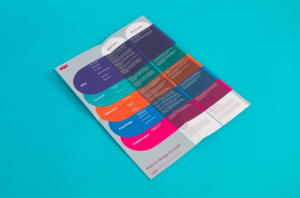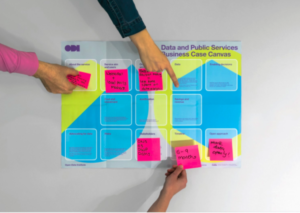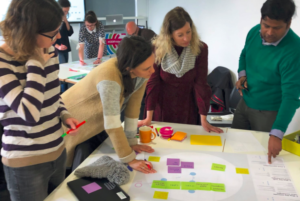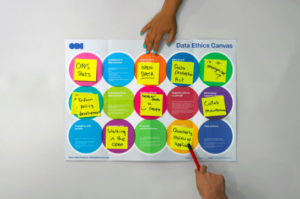
Data is playing an ever increasing role in improving public services. From bin collection to mental health services, data collected by local governments can help services designers identify where the demand is highest and where to invest a shrinking budget
The ODI has been working with local government across the country to understand the challenges local governments face and how data can help overcome these to improve services for citizens. As a result of this work, the ODI has developed the simple, jargon-free Data and Public Services Toolkit which is free to download from the website or available in print on request. The toolkit is designed for service managers in local government and service design agencies using data to design and streamline services for citizens.
We’ve found there are common barriers to effectively designing public services with data, below are some suggestions on how the toolkit can help to overcome them.
1. Difficulty scaling

Local authorities must constantly adapt public services to make sure that they continue to meet the needs of citizens, but keeping up can be difficult without the money and time to spend on service redesign.
It’s therefore important that local authorities share as much as they can about their services, so that others can learn from their successes and failures, as well as repurpose and redeploy these services in their own area.
There are many local authorities that are already delivering fantastic data-enabled public services, but these services are often designed in a way that restricts other organisations from effectively scaling them.
There are a number of factors which can affect scalability, such as the use of expensive proprietary software instead of an open source alternative, or licences on data that are unnecessarily restrictive. Checklist - how to design to scale is a useful guide to help service managers and designers better understand the factors that limit scalability, and to explore ways in which they might be able to design more scalable services.
2. Lack of best practice examples
It’s much easier to explore new ways of working with data, when you can see that others have successfully done so already. We’re helping service designers scale their projects by creating a bank of evidence which can be taken to budget holders to prove successful scalability amongst peers.

For example, our case studies feature a Careers advice in Doncaster which uses data to provide agg
regated advice and guidance for young people – making information about post-16 career options more freely available and accessible. Another example is the Addiction Recovery Companion (ARC) app which used data from the Drug and Alcohol services data to track progress, boost motivation and access recovery services in Edinburgh.
We also advocate for a more supportive environment, where local governments share findings and feedback from less successful pilots, promoting a more collaborative way of working.
3. Lack of senior buy-in

There is a general feeling amongst service designers that the senior budget holders in local government are not ‘data people’, and therefore sometimes find it difficult to visualise the benefits data can bring to a community.
Lack of evidence encourages this behaviour but the prevailing economic background puts budget holders in an increasingly difficult position with a higher demand for innovative public services and less money to spend on them.
Our Data and Public Services Business Case Canvas helps service managers and designers make a case for their projects and focuses on the practical elements that budget holders need to help inform financial decisions.
4. Siloed working and lack of data accountability
Effective service design depends on multi-department collaboration, however many local government teams tend to work in silos.
This can result in datasets with no clear owners responsible for maintaining them or making them accessible, and service managers and designers simply not knowing what datasets are available to them.

The Data Ecosystem Mapping Tool brings teams together and maps out all datasets available, helping them understand the flow of value through their data ecosystem, how they can make the best use of that data and establish clear roles and responsibilities.
5. Fear of ‘getting it wrong’ with data

A recent poll we conducted with YouGov, revealed that less than one in three people (31%) trust local government to use data about them ethically. This lack of trust is a barrier for local governments, potentially making it harder for them to access and use
new data about their community to design services.
The costs of ‘getting it wrong with data’ are high and understandably local governments are
wary of making errors which might allow individuals to be identified or might compound this mistrust. The Data Ethics Canvas helps service design teams avoid the
se pitfalls by mapping out the possible ethical risks. It poses questions such as ‘who could be negatively affected by this project?’ and ‘what steps can you take to minimise harm?’.
Get your own copy of the toolkit
Get your own copy of our Data and Public Services Toolkit.
If you are already using the toolkit, we would love to hear how you are getting on. Email us at [email protected]. Whether it’s a working example of the toolkit being used to design part of a public service or a common barrier that you are experiencing when using the toolkit with your team – we want to know.